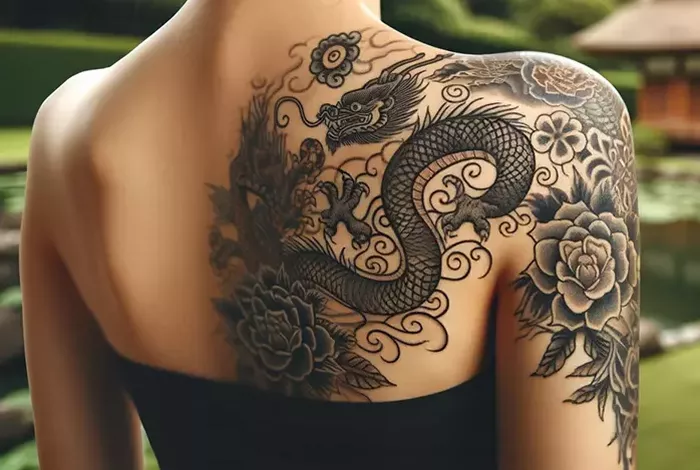Tattoos, once considered a taboo art form, have gained widespread acceptance in many parts of the world, symbolizing personal expression, cultural identity, and artistic appreciation. However, in Japan, a country known for its rich cultural heritage and deep-rooted traditions, tattoos remain a subject of contention and are even considered illegal in certain contexts. This seemingly paradoxical stance on body art raises the question: Why are tattoos illegal in Japan?
To delve into this complex issue, it is essential to explore the historical, cultural, and legal factors that have shaped Japan’s perception of tattoos and led to their restrictive regulation.
Historical Context: The Stigma of Tattoos
The aversion to tattoos in Japan can be traced back centuries, rooted in a complex interplay of cultural, social, and historical factors. Historically, tattoos were associated with criminality and social deviance in Japan. During the Edo period (1603-1868), tattoos were used as a form of punishment for criminals, marking them as outcasts and effectively branding them for life. This association between tattoos and criminality left a lasting imprint on Japanese society, contributing to the stigma surrounding body art.
Additionally, tattoos were commonly associated with marginalized groups such as actors, laborers, and members of the yakuza, Japan’s notorious organized crime syndicates. The visibility of tattoos among these groups further reinforced negative perceptions and contributed to their social ostracization.
Cultural Perspectives: Conflicting Values
Central to the debate surrounding tattoos in Japan are conflicting cultural values and societal norms. Traditional Japanese culture places a strong emphasis on conformity, harmony, and respect for authority. In this context, tattoos, with their association with rebellion and nonconformity, are often viewed as disruptive to social cohesion and harmony.
Moreover, the concept of “honne” (true feelings) versus “tatemae” (public facade) is deeply ingrained in Japanese society. While individuals may have personal inclinations towards self-expression and individuality (honne), there is often pressure to maintain a facade of conformity and adherence to social norms (tatemae). Tattoos, as visible markers of personal identity, can challenge this delicate balance and are sometimes perceived as a form of defiance against societal expectations.
Legal Restrictions: Regulation and Enforcement
The legal status of tattoos in Japan is governed by a combination of national and local regulations, as well as enforcement practices that vary across different regions of the country. While there is no explicit nationwide ban on tattoos, certain restrictions and prohibitions exist, particularly in public spaces such as hot springs, swimming pools, gyms, and beaches.
One of the primary reasons for these restrictions is the association of tattoos with the yakuza and organized crime. Many establishments, particularly those catering to families and tourists, enforce strict no-tattoo policies as a means of deterring yakuza members and maintaining a safe and welcoming environment. This practice, while not explicitly mandated by law, has become widespread, effectively marginalizing individuals with tattoos and reinforcing negative stereotypes.
Additionally, the Japanese Ministry of Health, Labour and Welfare requires that only licensed medical practitioners with specific qualifications perform tattooing procedures. This regulation, intended to ensure public health and safety, effectively limits the accessibility of tattooing services and contributes to the underground nature of the industry.
Shifting Attitudes: Towards Acceptance and Change
Despite the long-standing stigma and legal restrictions surrounding tattoos in Japan, there are signs of shifting attitudes and evolving perspectives towards body art. In recent years, there has been a growing acceptance of tattoos among younger generations, particularly in urban areas and among creative communities.
Furthermore, international influences and exposure to Western culture have contributed to changing perceptions of tattoos as a legitimate form of self-expression and artistic practice. Events such as the Tokyo Tattoo Show and the rising popularity of tattoo culture on social media platforms have helped to destigmatize tattoos and showcase their artistic merit.
In response to these shifting attitudes, some businesses and establishments in Japan have begun to relax their no-tattoo policies, recognizing the potential economic benefits of catering to a diverse clientele. Additionally, there has been a rise in the number of licensed tattoo studios operating openly, albeit with certain limitations and regulatory hurdles.
The Path Forward: Balancing Tradition and Modernity
As Japan grapples with the complexities of its cultural heritage and the pressures of globalization, the issue of tattoos remains a microcosm of larger debates surrounding identity, expression, and social change. Finding a balance between preserving traditional values and embracing cultural diversity is essential in navigating this delicate terrain.
Moving forward, policymakers, businesses, and society as a whole must engage in open dialogue and critical reflection to address the underlying attitudes and biases that perpetuate the stigma surrounding tattoos. By promoting education, awareness, and inclusivity, Japan can move towards a more equitable and accepting society where individuals are free to express themselves without fear of discrimination or marginalization.
In conclusion, the prohibition of tattoos in Japan reflects a complex interplay of historical, cultural, and legal factors that have shaped societal attitudes towards body art. While the stigma and restrictions surrounding tattoos persist, there are signs of progress towards greater acceptance and inclusion. By acknowledging the rich diversity of human expression and embracing change, Japan can chart a path forward that honors both its cultural heritage and the evolving needs of its people.

